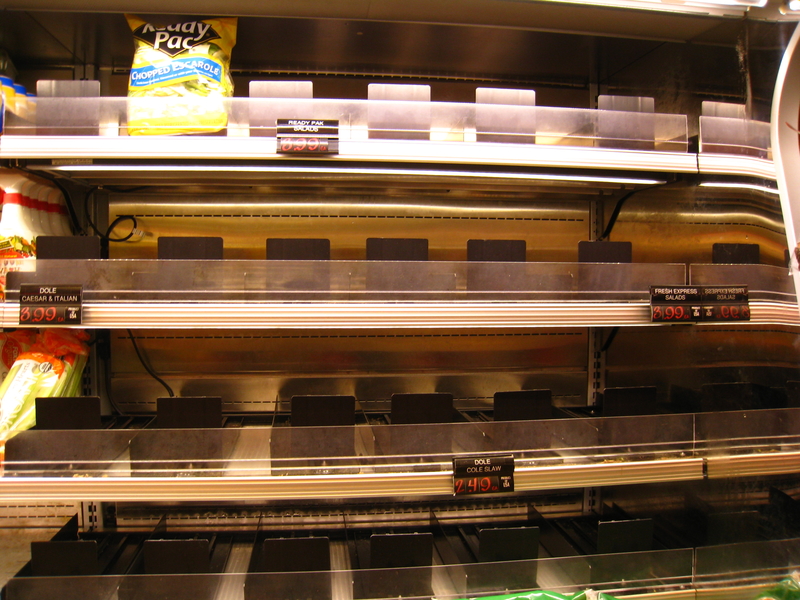Routinely, regionally, after a disaster, grocery stores are inundated with desperate, unprepared people.
Here is a list of things you can do to ensure you do not end up fighting with the masses should you ever have to endure a large-scale survival situation.
Join a local CSA! Try out local harvest to find one near you. You never know, you could find a great one and wind up getting the majority of your food from it!
Utilize your local farmers market. I know, a lot of farmer’s markets aren’t year round. That doesn’t really matter, though. You can chat with the farmers in season, and make friends. They may very well have something else they could give you, trade or sale. Aside from, you can glean all sorts of information from these folks so you can:
Start a garden of your own! Try turning that brown thumb into a green one. Instead of petunias plant some blueberry bushes. Instead of a garden bed full of wildflowers, grow some vegetables and fruits for you and your family to enjoy. Nothing, and I mean nothing, beats the taste and satisfaction of a ripe red tomato that you grew in your own yard.
Get some backyard chickens, if you’re allowed. This is the first thing I’m doing when we move, getting some chickens. We can’t have them here. Fun fact, did you know that people used to be encouraged (i.e.. required) to keep backyard chickens?? True story.
Menu plan! Try to do it seasonally. I’m not saying you can’t, or shouldn’t, change things up, but you know what’s readily available in each season, work from there.
Plus, not many people want to turn on their hot ovens when it’s 100 degrees outside. So, make a rough list of about a months worth of food for each season your area has. We have all four here, so I would make four “menus” and work from there. I might make my actual menu plan more often, but the list gives me something to work from.
Don’t use paper products. Trade in your paper towels for cloth. Use regular dishes instead of paper (or foam) plates. Cloth diaper. You can also use family cloth in place of toilet paper and reusable feminine products as well.
Can’t have backyard chickens? That’s alright, try meat rabbits instead. Most ordinances don’t include them in their wording!
Learn how to forage. Do you know what weeds are edible? Berries? Might be fun to learn, and definitely a good thing to know!
Go fishing. Farm raised fish aren’t really all that great for you, anyway. Grab a pole, take the kids, and catch some dinner! I love to fish.
Take it up a notch, go hunting. I know, some people are totally against this. Most of these people will tell you this while having a large slice of cattle sitting on their dinner plates.
Even if you only do a few of these things – say, routinely visit a farmer's market, meal plan and cut down on paper use – you have greatly reduced your reliance on grocery stores or at least allowed yourself the ability to plan ahead for if there ever is a food shortage.
Better, apart from being prepared for the “when” as opposed to gambling on the “if” not happening, you also will get a greater sense of where your food comes from.
For more information on living grocery free or at least “grocery greatly reduced,” please visit The Rustic Elk.

Yes all ready seeing a shortage in jackson Wy.
Interesting….thanks for sharing.
Finally, a TRULY practical article here! So many of your articles recommend commercial products, instead of telling people how to improvise. Well, when the SHTF, you won’t be able to buy all kinds of stuff, and whatever you’ve managed to stockpile will run out quicker than you can imagine. I literally lived off the land and my wits for 15 years (1992-2007), in the Sierra Madre Occidental of western Mexico, with nothing but a couple of changes of clothes and a very good multi-use knife. And no, I’m not ex-military. I’m a 72-year-old widowed teacher. Instead of trying to stockpile expensive commercial items that you may not even be able to take with you, learn how to improvise, and how to make do. Learn to grow your own food and save your own seeds. Learn what wild foods are edible in your area (or wherever you plan to go), how to recognize them, how to prepare them, and how to forage for your food. Spend weekends practicing foraging. Learn about herbal remedies (and prevention). Learn how to build shelters (temporary and long-term) from whatever is available, and/or whatever you can scrounge up. Learn how to raise chickens and goats, and other small livestock that don’t require a lot of land. Learn how to purify water with the sun, how to build an outdoor oven from mud and clay, how to build a slow steady fire, even with wet wood. I live in a small town in Mexico now, but I still live simply, with manual tools in my kitchen instead of electric ones, and grow most of my own food. I haven’t forgotten what I learned during those 15 years. Whatever happens (and the worst will), whenever it happens, I’m ready. If you’re serious about surviving, you’d better be ready, too. And thanks, DHS, for a practical article, at last.